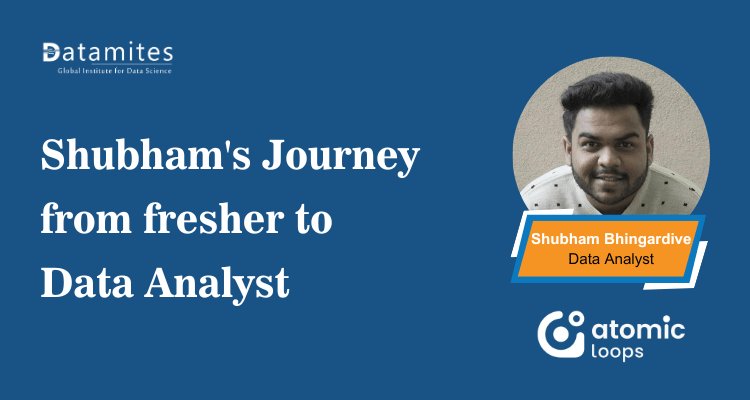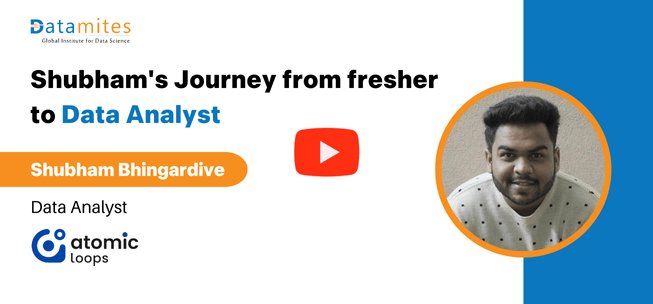Shubham's journey from fresher to data analyst
Shubham’s inspiring journey from a mechanical engineering fresher to a skilled data analyst highlights determination, consistent learning, practical training, and guidance, showcasing how DataMites® helped him achieve career success in data analytics.

Transitioning from a non-technical background to a flourishing career in data analytics may seem daunting, but Shubham Bhingardive’s journey proves it is achievable with dedication, the right guidance, and consistent practice. We will explore his transformation from a mechanical engineering graduate to a successful data analyst through a certified program at DataMites®.
Shubham’s career path as a data analyst from fresher
Shubham Bhingardive’s inspiring journey from a mechanical engineering graduate to a successful data analyst highlights the power of consistent learning, real-time projects, and expert guidance from DataMites®. Discover how freshers can break into the data analytics field and build a rewarding career.
Q1: Can you introduce yourself to our readers?
Shubham: I am Shubham Bhingardive from Ahmednagar. I completed my mechanical engineering from Pune University. While seeking opportunities in the IT sector, I realized the potential of data science and pursued a Certified Data Scientist course from DataMites®, which eventually helped me land my first role in this field.
Q2: Why did you switch from mechanical engineering to data science?
Shubham: In 2015, the mechanical engineering sector faced a recession, making job prospects challenging. Many engineers, including myself, sought opportunities in the IT field by choosing Top IT Courses in Pune. Data science appealed to me because it offered career growth, and friends recommended DataMites® for its certification program.
Q3: What kind of questions were asked in your interviews?
Shubham: The interviews started with Python programming questions like writing a palindrome or Armstrong number program. They then covered statistics, data visualizations, univariate and bivariate analysis, ensemble techniques, favorite algorithms, and basic deep learning concepts. Interviewers also assessed my knowledge of the latest AI tools and leveraging AI into data analytics.
Q4: Did you have prior experience in programming or IT?
Shubham: My background was primarily mechanical, with only basic knowledge of C and C++ in the first year of engineering. I also worked in a non-tech role at Cognizant in the health insurance process. Learning Python and other data analysis tools from scratch required dedication and consistent daily practice.
Q5: How did you manage learning Python and other tools with a non-tech background?
Shubham: I prioritized my learning schedule. I attended weekend sessions at DataMites® and practiced daily for 2–2.5 hours. Regular coding practice, revisiting session programs, and uploading projects to GitHub helped reinforce my skills and build a strong portfolio.
Refer to the articles below:
- Shriram Bhat's Journey to Data Analyst
- Prakash's inspiring journey as a data analyst
- Little Flower’s Inspiring Journey as Data Analyst
Q6: How important are mock interviews in preparing for a data analyst role?
Shubham: Mock interviews were crucial. They covered Python, statistics, machine learning, and libraries. These sessions helped me identify knowledge gaps, improve confidence, and made actual company interviews much easier to handle.
Q7: How was the internship and training experience at DataMites®?
Shubham: The internship offered real-time projects. I worked on four projects with team support and instructor guidance. These data analysis projects taught practical problem-solving, data insights extraction, and applying analytics techniques effectively.
Q8: How was the support from the PAT (Placement Assistance Team)?
Shubham: The PAT team was highly supportive. Initially, I considered unrelated roles, but they guided me to stay within my domain data science. They helped me target the right opportunities and successfully secure a data analyst role.
Q9: Any advice for freshers aspiring to become data analysts?
Shubham: Opportunities for freshers exist, but hard work and consistent practice create them. Challenges are inevitable, but perseverance, prioritization, and proper guidance make the journey smoother.
Q10: How did DataMites® contribute to your job placement?
Shubham: DataMites® provided structured training, real-time projects, mock interviews, and placement assistance. Their team helped refine my resume and apply to suitable companies. Thanks to their support, I successfully landed my first job as a data analyst.
Key findings from Shubham’s journey as a data analyst:
Shubham Bhingardive’s transition from a mechanical engineering graduate to a successful data analyst offers valuable lessons for anyone aspiring to enter the field of data analytics. His journey emphasizes the importance of dedication, consistent learning, and practical experience.
1. Career switching made possible: Shubham’s journey proves that switching from a non-technical domain to data analytics is achievable with the right mindset. Guidance from mentors and structured learning programs can make this transition smooth and effective.
2. Importance of consistent learning: Even without prior programming knowledge, Shubham dedicated himself to learning Python, SQL, and analytics concepts every day. Consistent practice and revisiting concepts regularly were key to mastering new skills.
3. Value of practical projects & internships: Hands-on experience through real-time projects allowed Shubham to apply theoretical knowledge in real scenarios. Internships not only enhance practical skills but also build a strong portfolio with effective cover letter that impresses potential employers.
4. Role of mock interviewsp: Mock interviews helped Shubham gain confidence and identify areas for improvement before facing real company interviews. They provide a safe environment to practice problem-solving and technical questioning techniques.
5. Effective time management & practice: Shubham managed his learning schedule efficiently, dedicating 2–2.5 hours daily to coding and analytics practice. Prioritizing tasks and maintaining a consistent routine were essential to achieving his career goals.
6. Staying updated with modern tools: Keeping up with the latest AI tools, machine learning techniques, and data visualization methods enhanced Shubham’s industry readiness. Being updated with modern technologies increases employability and career growth opportunities.
Shubham Bhingardive’s journey shows determination, learning, and proper guidance. This inspiring DataMites success story proves that with the right support and structured learning, even those from non-technical backgrounds can achieve remarkable success in the data analytics field. According to a PwC report, artificial intelligence has the potential to contribute around $15.7 trillion to the global economy by 2035. This massive growth also highlights the rising demand for skilled data analysts who can interpret complex data and provide actionable business insights.
Refer to the articles below:
- Data Analyst Course Fee in Pune
- How to Become a Data Analyst in Pune
- Data Analyst Career Scope in Pune
DataMites Institute is a premier IT training provider, offering specialized programs in Data Science, Artificial Intelligence, Machine Learning, Python, Data Analyst courses in Chennai, Data Engineering, and IoT. Through practical projects, internships, and dedicated placement support, students acquire industry-ready skills. Moreover, globally recognized certifications from IABAC and NASSCOM FutureSkills enhance their professional credibility.
In addition to its Data Analyst courses in Pune, DataMites delivers flexible, industry-focused training across major Indian cities including Mumbai, Bangalore, Hyderabad, Ahmedabad, Chandigarh, Delhi, Jaipur, and Coimbatore. This approach ensures that learners nationwide have access to high-quality IT education that aligns with current industry requirements.

